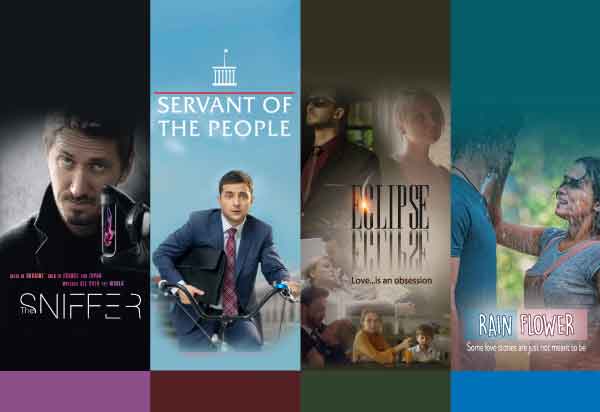Are Ukrainian Dramas the Next Big Thing
One of the newest dramas that have become popular, are from Ukraine - Servant of the People and The Sniffer.

It can be underlined in its attempt to use satire and mockery as an integral part of the narrative, not only as a source of entertainment but also to make a statement on the State.
TV Drama – A Cultural Tool
Presently, Transnational linkages or international interconnections result in a curious cultural mix and tensions. These implications and their impact form a potent area of inquiry in the cultural discourse. Its significance can be witnessed in the government’s effort of incorporating television dramas as part of their foreign policy initiatives. This can be seen in the worldwide popularity of Korean teen genre, K-Pop, internationally known as ‘Korean Wave’, starring Korean youth heartthrobs, catering to the teenage audience, which were exported to the world as a means to display the new, modern, contemporary South Korea. Similarly, Turkish dramas were used as ‘soft power’ by Turkish government for “building their national identities” (Cetin, 2014, p1) as well as international. Imperial period costume dramas, which have been a staple diet of prime time television viewers in China, have been banned by the State media as it twisted the narrative of the country’s past and for its extravagance and negative influence on the society, affecting their international image.
Television dramas are one of the most powerful long-form fictional cultural product of modern media industries. As an effective mass media instruments, they have been utilized by the governments of various countries such as China, South Korea and Turkey to showcase its culture to the world. Their contextual logic rooted in the socio-cultural history of the country/region, the present reality of its people and the future imagination of what the country aspires for itself. A closer look at the generic international trends clearly points to the fact that TV dramas are a significant “means of cultural formation” (Geraghty, 2003, p26).
The Rise of Ukrainian Dramas
The recent developments in the media industry suggests that there is a rising interest towards Ukrainian dramas. US streaming company Netflix acquired its first Ukrainian drama, Servant of the People (2015), which is about an ordinary schoolteacher accidently becoming the President of his country. In a rare case of real reflecting the reel, the protagonist of the series, Volodymyr Zelensky, became the real President of Ukraine in 2019. Similarly, another Ukrainian drama, The Sniffer (2013), which centers on a detective who solves crime using his olfactory skills (he has a keen sense of smell) has garnered worldwide success. The stories coming out of Ukraine have been on an upward journey with the producer of the series The Sniffer, Iryna Kostyuk mentioning, “Volume-wise, everything is growing. Even the smallest production company is now filled with orders.” Ukrainian shows Ruby Ring (adapted from award-winning Korean drama of the same name) and Eclipse has also performed well for the channels in its home country.
The success of the Ukrainian shows like Servant of the People and The Sniffer can be underlined in its attempt to use satire and mockery as an integral part of the narrative, not only as a source of entertainment but also to make a statement on the State. Professors Elena Korosteleva and Vsevolod Samokhvalov (2019) suggest that by deploying mockery through entertainment, Zelensky showcased and expressed the frustration of Ukrainian citizens. Satire is a powerful tool to emphasize on the burning contemporary issues because “public comedy in any society — the object and style of mockery, of laughter — can say a lot about relations between authorities and civil society, and about the possibility of criticism of the state” (Sukovata, 2017, p57).
Post-Soviet Union – A New Image
In 1991, after separating from Russia due to Soviet Union collapse, Ukraine had a non-existent television history that gave them the opportunity to begin anew. Ukraine established new television channels (Inter, 1+1) with the help of foreign support. By adopting a practical attitude, they imbibed new ideas, opened their minds to foreign programs, experimented with audience tastes and preferences and took inspiration from prime television-producing countries, namely, US. Perhaps, Ukrainian television producer Aleksey Goncharenko best described the situation when he said, “In America TV started developing at the end of 1930s, in Ukraine – in the mid-1990s. That’s a gap of 60 years! Whilst Ukraine was in slumber, like a Sleeping Beauty, everything has been thought of and invented.”
Marta Dyczok, Associate Professor of History and Political Science at the University of Western Ontario highlights that Ukrainians tastes and habits were influenced by Europeans and North Americans. In 2012 the most viewed television programs in Ukraine were equivalent to those in the US and UK – drama, sitcoms, sports and reality shows. She further mentions that in 2012 over 30 million social network accounts were registered in Ukraine, nearly 66 percent of the total population, which puts it on par with US and UK.
Ukraine has been an active participant in the process of transnational cultural connections and mass media has played a vital role in those interactions. This process of cross border cultural connections and gradual induction into what Marshal McLuhan termed as ‘global village’, has visibly impacted the Ukrainian identity as well its politics.
The Humane Tales of Ukrainian Dramas
Ukrainian dramas depict the everyday lives of normal, ordinary people. In Ruby Ring, a single mother raises her daughter with the help of her sister-in-law after being abandoned by her husband. Eclipse underlines how man creates a support structure, even though in a wrong way, to give meaning to his life. Servant of the People showcases President Goloborodkois as a schoolteacher who rides a cycle, is approachable and still resides with his parents. In The Sniffer, the eponymous protagonist is an isolated man with an ex-wife and a teenage son, who tolerates his father because he gives him money. In Faina Ukraina (The Good Ukraine/ 2008), a popular Ukrainian show, the characters are regular, everyday Ukrainians, “belonging to different social and professional groups – office managers, middle-level journalists, single, middle-aged women in search of rich partners, stupid officers” (Sukovata, 2017, p63).
The human and the humane stories of Ukraine reflect the current social –political scenario witnessed by countries and its citizens across the world. The stories are tied by the thread of universal human emotions of love, family and relationships that bind people together across boundaries and geographies, establishing a deep sense of connection and an ‘imagined community’ as articulated by Benedict Anderson (1983).
Beneath the deep complex social structure that these stories address, are tales of underdogs who are driven by the dreams of a better life and are willing to go against the crippled systems. Perhaps actor Volodymyr Zelensky perfectly reflected this theme when he addressed his people during his Presidential campaign. He said,
“I am not a politician, I am not a politician at all,” Zelensky said over the shouts of Poroshenko’s supporters. “I am just a human being, an ordinary human being, who has come to break this system.”
References
- Dyczok, M. (2014). Ukraine’s Media in the Context of Global Cultural Convergence. Demokratizatsiya, 22 (2), p231-253.
- Jung, E.Y., 2009. Transnational Korea: A Critical Assessment of the Korean Wave in Asia and the United States. Southeast review of Asian studies, 31, p69-80.
- Khinkulova, K. (2012). Hello, Lenin? Nostalgia on post-soviet television in Russia and Ukraine. VIEW Journal of European Television History and Culture, 1(2), p94-104.
- Sukovata, V. (2017). In the context of Bakhtin’s philosophy of laughter & the postcolonial perspective: Ukrainian popular culture. Baltic Worlds 2017: 1-2, p57-65.
- Zhurzhenko, T., 2001. Free market ideology and new women’s identities in post-socialist Ukraine. European Journal of Women’s Studies, 8 (1), p29-49.
